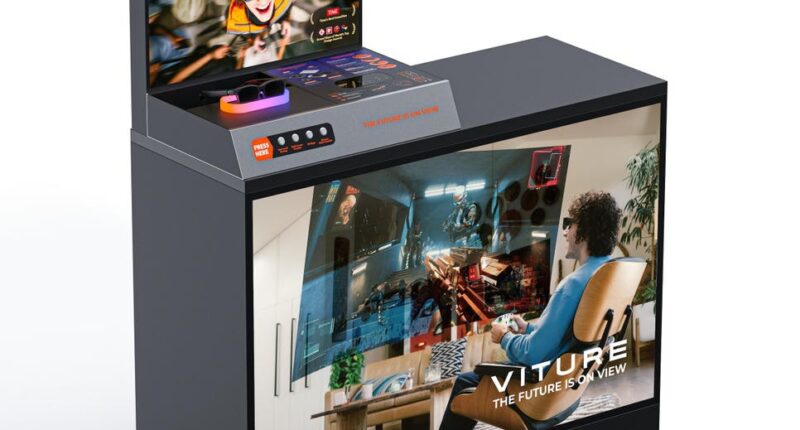Share this @internewscast.com
Stepping into the future of personal entertainment, video display glasses have finally hit the shelves, offering customers the chance to try before they buy. Viture’s innovative Luma Pro XR glasses, now available for live demonstrations at select Best Buy locations across the United States, promise to revolutionize viewing experiences. Utilizing twin Sony micro-OLED displays, these glasses create a high-definition virtual screen right in front of your eyes, bringing extended reality to life for $499.
For those visiting the Best Buy in Burbank, California, the Viture demo station is strategically placed near the gaming TVs, adjacent to the Quest display—although the Quest isn’t available for trial. Here, you can experience the immersive world of Viture’s video display glasses, whether you’re diving into big-screen gaming, enjoying a 3D movie, or tackling productivity tasks with multiple screens.
Elsewhere in the same Best Buy, Meta showcases its Ray-Ban AI audio smartglasses. These popular frames, offered in classic Ray-Ban Wayfarer and Oakley styles, have received glowing reviews. They handle phone calls, play music, capture photos and videos, and provide access to Meta AI voice chat for photo analysis and translation, though they lack a display.
At the forefront of innovation, Meta recently announced the Ray-Ban Display at their September Meta Connect event. This new model introduces a small screen on the right lens and features a gesture-based wristband, the Neural Band, offering a different experience from their successful audio-only version. However, securing a demo for the Display glasses has proven challenging. I managed to book a session over a month in advance at Meta’s forthcoming Lab store on Melrose Avenue, which remains unopened.
During a visit to the Ray-Ban store in Glendale, the Display glasses were on display but locked away. Store representatives indicated that hands-on demos would commence shortly. Meta has launched an online booking system for display-glass demonstrations at selected Ray-Ban, Best Buy, and Lens Crafter locations, as well as in its Burlingame Meta Store and soon-to-open LA outlet. According to reports from Business Insider and Android Central, Meta is planning to broaden its retail presence in 2026, with new physical stores set to open across North America and Europe.
Contrasting with Meta’s strategy, Viture is opting for a more conventional retail approach. Their demo stations in Best Buy allow anyone to experience the glasses firsthand. Simply plug in, put them on, and revel in the bright, crisp 1200p images that seem to float effortlessly before you. The experience is akin to having a personal monitor that you can take anywhere, far removed from the confines of a traditional headset.
Inside the Ray-Ban store in the Americana AI smart glasses are front and center.
Charlie Fink
When I visited the Ray-Ban store at Glendale, the Display glasses were locked behind glass. Staff said appointments for hands-on demos would begin in a few weeks. Meta has launched a booking site for display-glass demos at select Ray-Ban, Best Buy and Lens Crafter stores, in its Burlingame Meta Store and upcoming new LA location. Reports from Business Insider and Android Central confirm that Meta’s planning to expand its own retail operations in 2026, including new physical stores in North America and Europe.
Viture, meanwhile, is taking a more traditional retail path. The company’s display-glass demo areas at Best Buy allow anyone to plug in, put them on, and see an image floating in bright, crisp 1200p. The experience feels less like a headset and more like a personal monitor you can carry anywhere.
Note the outward facing cameras, which also act as sensors for hand tracking and spatial computing.
VITURE
Viture’s Luma Pro glasses, compatible with prescription lenses, connect via USB-C to nearly any device: Nintendo Switch, Steam Deck, PlayStation, Xbox, Mac, or PC. Accessories include the $159 Mobile Dock for the Switch, the $299 Neckband for standalone playback, and an 8BitDo controller designed for XR gaming. The company calls its displays “the Clarity King,” and reviews have praised their sharpness and color fidelity.
Emily Wang, Viture’s co-founder and CMO, said the Best Buy rollout fulfills a long-standing request from customers. “People have been asking for an in-person way to try our glasses for years,” she said. “By showcasing at Best Buy, we’re making extended reality as approachable as any other consumer technology.”
The comparison between Meta and Viture highlights two different visions of smart eyewear. Meta’s Ray-Ban Display offers a lightweight, monocular heads-up screen suited for notifications, navigation, and AI assistance. Viture’s binocular video-display glasses turn any input into a full-screen experience for gaming, streaming, or productivity. Both represent the move from speculative hardware toward tangible products you can touch, test, and compare in stores.
Meta is betting on exclusivity and premium design, controlling the rollout through scheduled demos and limited inventory. Viture is betting on access, placing high-resolution display glasses directly in the hands of shoppers. Either way, the future of wearable screens has hit retail shelves. For the first time, consumers can decide which vision they prefer, one built for information, or one built for immersion, gaming and entertainment.








